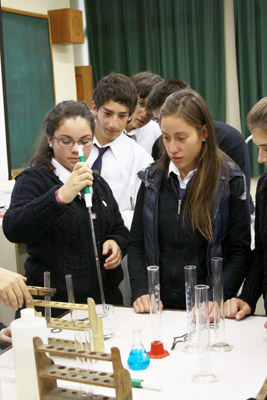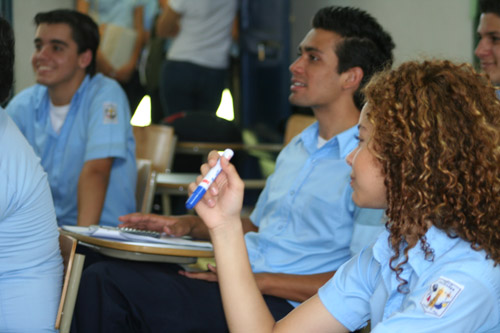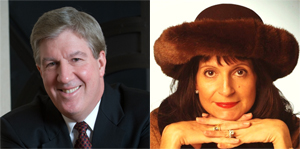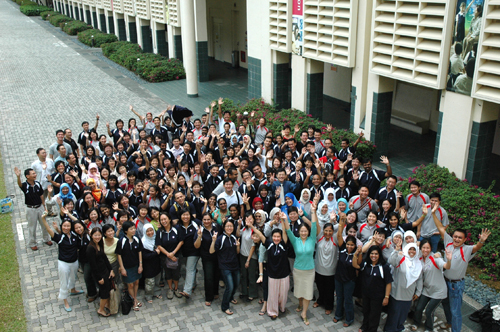
國際文憑 (IB) 繼續在改變世界各地學生的生活中發揮重要作用. 除了PISA, 這是衡量學生對全球同齡人成績的唯一測試.
博士. 托尼·瓦格納, Innovation Education fellow at Harvard University and author of the new book, 創建創新 (due out April 17), 說明, “I do agree that the IB is a significantly better framework for intellectual rigor than the advanced placement (AP) curriculum for several reasons: the requirement that all students complete a 4500 word research paper, the service learning requirement, and the interdisciplinary theory of knowledge requirement, all of which take learning beyond the confines of the conventional curriculum.”
Jeffrey R. Beard joined the International Baccalaureate in September, 2005. He became Director General in January, 2006. I had the opportunity to discuss with Jeffrey the ways in which the IB program continues to offer students a unique international education.
什麼樣的教育系統將允許一國擁有全球競爭所需的人的技能?
It’s our belief at the International Baccalaureate that every child around the world should have the opportunity to have a high quality global education. One of the things I am proud of is that we cross national boundaries. Approximately one million students in 141 countries and in a wide variety of schools (私人, 狀態, 公開) have experienced the IB. Many of these countries recognize the need for students to have 21st century skills. 這些技能包括批判性思維, communication and language acquisition; and as highlighted by the National Center for Education in its 2006 報告, 創造力, 革新, use of ideas, abstraction, 自律, and the ability to function as part of a team. These capabilities are embedded in our programs in an international context. They give students the perspectives of other cultures, 社會和國家, and teach them how they can engage with their peers. We are now seeing stronger uptake from countries around the world who want to bring the IB education into the forefront.

你對標準化考試的意見? How does the IB assessment compare?
I believe standardized testing has a place. It should be one piece of the student portfolio versus the whole assessment. Some universities put all their emphasis on the standardized test. I think it’s fine to include those scores in a portfolio of work, but it should only be part of the assessment universities use to make their admissions decisions. The SAT and ACT tests are used to rank students for limited places in an admissions process. The tests are imperfect and imprecise. They express knowledge in limited dimensions using multiple choice questions.
The difference with the IB assessment is that we rely on an international approach that measures students using the same criteria worldwide. At the end of their senior year, IB students sit for about three weeks to take their final exams for their diploma. The exams are then sent to be marked by international examiners which are both IB educators in schools and university professors. Our system is criteria-based rather than norm-based. Seven is our highest score. When our students see their results, they know that those results have been measured against their international peers around the world. I am not aware of any other assessment program available to US students in K through 12 apart from PISA that measures the performance of students against their global peers. We also approach assessment from a whole child point of view. We incorporate community service, leadership and character as part of that assessment through the mandatory completion of CAS (社區, 行動, and Service).
What is the importance of teachers in the IB process?
Teachers are the key to the whole program. All the international studies of top educational systems (芬蘭, 新加坡, 韓國, 香港) have shown us that the teacher is what makes the difference. The successful countries take their approach to teaching very seriously. They elevate the importance of teachers. They screen candidates for suitability before they go to university in contrast to the US system and many other countries. The top countries accept fewer teachers and they are put more resources behind each teacher along the way. They treat teaching as a highly respected profession. Once teacher pre-service training is complete, ongoing professional development of the teacher is also very important. You see more mentoring in the classroom. You see more feedback in the classroom. That doesn’t happen in many other countries, where teachers come out of school and that may be the last formal training they have.
The IB approach to professional development is a pedagogy that’s based on a constructivist understanding of how students learn. It’s a theory of cognition, widely used and accepted, which asserts that knowledge is not passively learned but actively built. It recognizes the importance of engaging and challenging learners in order to improve their understanding and comprehension. To become an IB school, all teachers must complete our category one training, which is built around these principles. 稍後的, the experienced IB teacher may attend a category two workshop, which provides more in-depth training in areas like internal assessment and research. 最後, the master IB teacher may go on to attend one of over 100 category three workshops which are aimed at refining a teacher’s skill in his chosen field. I am not aware of any other program that offers a continuum of professional development that allows teachers to develop skills and then enhance those skills over a period of years. Our online curriculum center also allows these same IB teachers to network globally, where they can share with other teachers what they are doing and find out what is working and what is not. So it’s all very synergistic and you can see the effectiveness in terms of student performance.

How does the IB teach international mindedness? Isn’t international mindedness something you need to experience first hand?
How we do that is one of our challenges, but one we have been able to overcome. 在美國, we are in about 1300 學校. 他們是, a school in the Midwest may have a more homogeneous student population and therefore it’s a bit more challenging to introduce the concept of international mindedness. We do it in a number of different ways. Through technology, we ensure that students are exposed to what is happening around the world and can network with IB students in different countries. We require students to take a second language. Teachers are required through their curriculum planning to bring in the dimensions of other cultures into their teachings. We offer courses like world religions, global politics, and the world studies extended essay. We also ensure that students themselves take on projects that are broader than their local community. IB schools are connected globally and so students are always able to interact with IB students in other cultures through our IB virtual community. In sum, international mindedness is deeply embedded in the curriculum, the online program, and the community service component of our programs. So while it is not the same as first-hand experience, there is so much built into the curriculum that even in a homogeneous location, we are able to embed these concepts.
Have you found that more schools have embraced the IB because students can be assessed on an international level?
開始, a lot of US schools implement the IB as a way of school reform. Struggling schools have seen teachers get better and students get better with the IB. As students get more into the program and do the assessments, there is a growing awareness that their grades can be compared to other students around the world. It’s an opportunity to grow beyond themselves. Students are already networked around the world through the internet. They’re seeing a melting pot of different nationalities, languages and cultures around the world, so the IB fits quite well into their paradigm.
What is the new diploma program from the IB, the IB Career-Related Certificate (the IBCC)?
The IBCC incorporates the educational principles of the IB into a unique offering that addresses the needs of students who wish to engage in career-related education. The IBCC encourages these students to benefit from elements of an IB education, through a selection of two or more Diploma Program courses in addition to a unique IBCC core, comprised of an approaches-to-learning (ATL) 課程, a reflective project, language development, and community and service. This new qualification is designed to provide a “value added” educational offering to schools that already offer the IB Diploma Program and are also delivering career-related courses to their students.
We are quite excited by the IBCC, which will be launched this year in September (2012). It is our foray into vocational and career-related work experience programs. It is for students who do not necessarily intend to go on to a four year university. They may instead desire technical training for a professional role and go directly into the workforce.
I attended an IB presentation with some of the graduating students from one of our pilot schools recently. It was attended by some local businessmen who told me: “We will hire anybody coming out of that school. We will give you funding. These kids are great!” We think the IBCC is going to be successful because it combines the skills that are offered in an IB program such as critical thinking, community service and international mindedness, along with a career-related education.

Photos courtesy of the International Baccalaureate Organization.
在全球搜索教育, 和我一樣,全球知名的思想領袖,包括邁克爾·巴伯爵士 (英國), 博士. 邁克爾座 (美國), 博士. 萊昂特司特因 (美國), 博士. 琳達·達林 - 哈蒙德 (美國), 博士. 馬達夫恰範 (印度), 邁克爾·富蘭教授 (加拿大), 霍華德·加德納教授 (美國), 伊馮娜赫爾曼教授 (荷蘭), 克里斯汀Helstad教授 (挪威), 讓·亨德里克森 (美國), 玫瑰Hipkins教授 (新西蘭), 科妮莉亞Hoogland教授 (加拿大), 太太. 尚塔爾考夫曼 (比利時), 多米尼克·拉方丹教授 (比利時), 休·勞德教授 (英國), 本·萊文教授 (加拿大), 巴里McGaw教授 (澳大利亞), Ř教授. 納塔拉詹 (印度), 博士. 丹尼斯教皇 (美國), 斯瑞達拉賈戈帕蘭 (印度), 博士. 黛安·拉維奇 (美國), 肯·羅賓遜爵士 (英國), 帕西SAHLBERG教授 (芬蘭), 安德烈亞斯·施萊歇 (PISA, 經合組織), 博士. 安東尼·塞爾頓 (英國), 博士. 大衛·謝弗 (美國), 博士. 基爾斯滕都沉浸式 (挪威), 總理斯蒂芬·SPAHN (美國), 伊夫Theze (法國公立高中美國), 查爾斯Ungerleider教授 (加拿大), 托尼·瓦格納教授 (美國), 迪倫Wiliam教授 (英國), 博士. 馬克沃莫爾德 (英國), 西奧Wubbels教授 (荷蘭), 邁克爾·楊教授 (英國), 和張民選教授 (中國) 因為他們探索所有國家今天面臨的大畫面的教育問題. 全球搜索教育社區頁面
ç. M. 魯賓是兩個廣為傳誦的在線系列,她接受了筆者 2011 厄普頓·辛克萊獎, “全球搜索教育” 和 “我們將如何閱讀?”. 她也是三本暢銷書, 其中 真正的愛麗絲夢遊仙境.
˚FollowÇ. M. 魯賓在Twitter: www.twitter.com/@cmrubinworld






最新評論